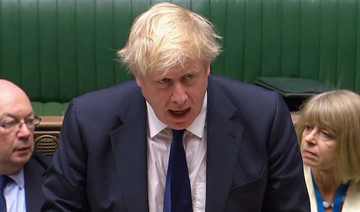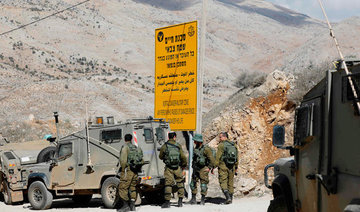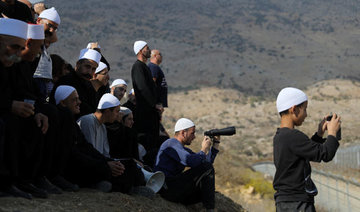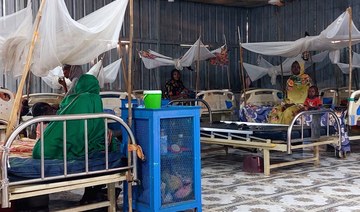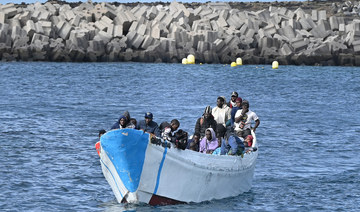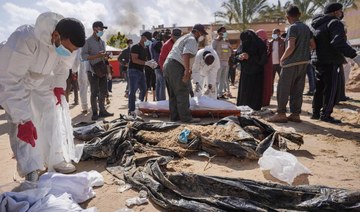BEIRUT: Syrian rebels agreed to surrender their last pockets of control in southwest Quneitra province to the government, state media reported Thursday, making way for Damascus to re-establish its authority along the Israeli frontier.
The deal, confirmed in its general outlines by a monitoring group and opposition activists in Quneitra, will put the Syrian government face-to-face with Israel along most of its frontier for the first time since 2011, when an uprising against President Bashar Assad’s rule swept through Syria.
A fleet of buses reached Quneitra on Thursday night to pick up fighters, activists and other residents who refuse to accept the terms of surrender, and evacuate them to rebel-held areas in northern Syria, the Syrian Observatory for Human Rights monitoring group said.
An affiliate of the Daesh group continues to hold a sliver of the frontier. The group is not party to the agreement between the government and rebels.
Syria and Israel fought two wars over their shared border, in 1967 and 1973, with Israel occupying the Golan Heights in the Quneitra province in the former confrontation.
But Israel has refrained from taking sides in Syria’s seven-year-long civil war, and Prime Minister Benjamin Netanyahu has indicated he does not object to the government’s return to southwest Syria — as long as Israel’s archenemies Iran and the Lebanese militant group Hezbollah stay clear of the frontier.
Delegations from the government and rebels met several times over the last two days to negotiate the terms of surrender, said opposition activist and photographer Moaz Al-Assaad.
Thousands of residents — including rebel fighters, media activists, medical workers and civilians — may be heading to north Syria instead of staying behind in Quneitra, according to Al-Assaad.
The UN and human rights organizations have condemned such evacuations as forced displacement. Few who have left are expecting to be able to return to their homes in the near-term.
Earlier on Thursday, a fleet of buses helped evacuate the last remaining residents from Shiite, pro-government villages in northern Syria that endured three years of rebel siege, to government territory in the nearby Aleppo province.
Some 7,000 people were evacuated from Foua and Kfraya, according to state media.
The transfers — which have become a fixture of the war’s later stages — are a conspicuous marker of the titanic shifts in Syria’s demographics.
Waves of violence against civilians and unforgiving terms of surrender have resulted in the reassortment of the Syrian population. The country’s majority Sunni population has been pushed out of the cities and, disproportionately, into camps and exile, while minorities have moved closer to the centers of government control.
The government was expected to release 1,500 militants and opposition activists from its jails in exchange for the Foua and Kfraya evacuations, according to Ahmed el-Shiekho, an official for the Syrian Civil Defense, a search-and-rescue group aligned with the opposition.
But it only released 200, el-Sheikho said, including many who were only picked up in the last few months for minor criminal offenses — prisoners with no connection to the ongoing political turmoil.
In southern Syria, rebels have been powerless to stop a month of government advances through southwest Syria’s Daraa and Quneitra provinces, facilitated by a relentless Russian aerial campaign against towns and villages held by the opposition.
Tens of thousands of civilians have been displaced by the fighting, and the UN’s children’s agency, UNICEF, appealed for access to reach some 55,000 children in need of humanitarian assistance in Quneitra.
Earlier this week, dozens of Syrians marched toward the frontier, pleading for help as government forces, backed by Russia, stepped up airstrikes on Quneitra. Israel has quietly treated thousands of displaced Syrians for wounds and illnesses over the years.
Many of those trapped by the Syrian government’s advances were hoping for relief from Israel, or some sort of a safe zone there, said Areej Ghabash, a local health worker in Quneitra.
“In truth, we have more faith in Israel than the (Syrian) government,” she said, adding she would leave Quneitra herself rather than surrender to the authorities.
Al-Assaad said a prisoner exchange involving an Al-Qaeda-linked group fighting alongside the rebels in Quneitra was still to be negotiated before evacuations could start.
President Assad, with unfaltering support from Russia and Iran, has all but crushed the revolt after seven years of destructive war that has taken the lives of more than 400,000 Syrians and displaced half the country’s population. Nearly 6 million Syrians — or roughly a quarter of the country’s pre-war population — are now refugees outside their own country.
Syria rebels agree to surrender frontier with Israel
Syria rebels agree to surrender frontier with Israel
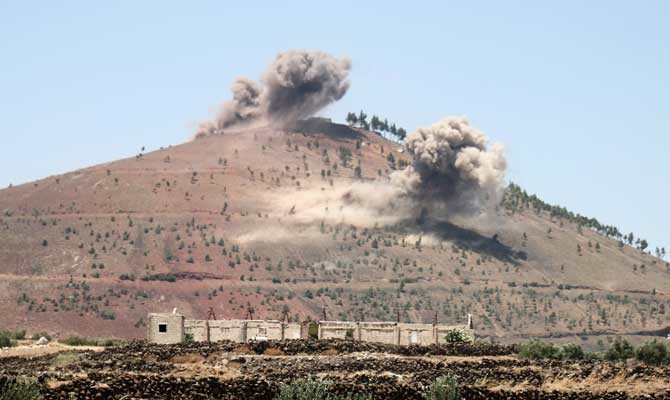
- If verified, the move would mark another major victory for President Bashar Assad
- Putin, Assad’s most powerful ally, cited the need to restore the situation along the Golan borders
Israeli attack on Iran would change ‘circumstances’, Iran’s president says
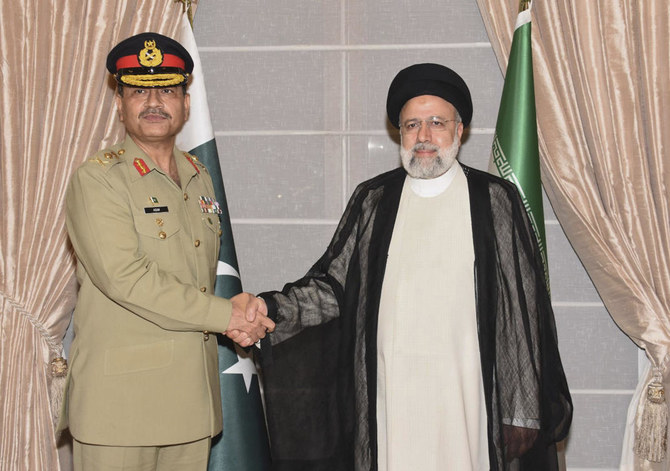
DUBAI: An Israeli attack on Iranian territory would bring about a complete change of “circumstances,” Iran’s President Ebrahim Raisi was quoted as saying on Tuesday by the official IRNA news agency.
Raisi, who is visiting Pakistan, was quoted as saying such an attack could possibly result in there be nothing left of the “Zionist regime.”
Truce crumbles in Sudanese army’s last Darfur holdout
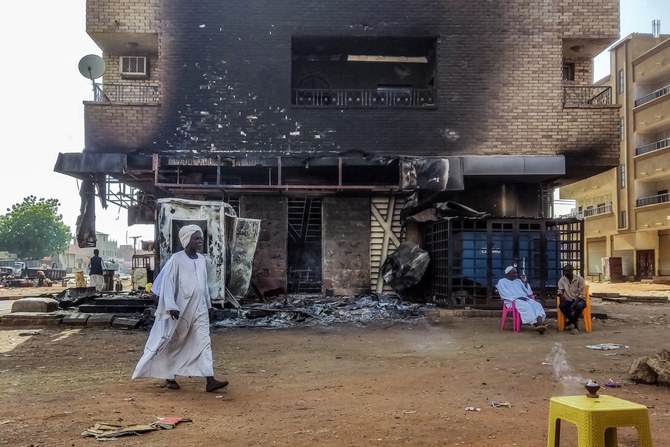
- Al-Fashir is the last major city in the vast, western Darfur region not under control of the paramilitary Rapid Support Forces (RSF)
- Witnesses say the army has reinforced supplies and troops, including through an air drop to its base in the city
CAIRO/DUBAI: Attacks around the Sudanese city of Al-Fashir have shattered a truce that protected it from a year-old war, leading to warnings of a new wave of inter-communal violence and humanitarian risks for 1.6 million residents crammed into the North Darfur capital.
Al-Fashir is the last major city in the vast, western Darfur region not under control of the paramilitary Rapid Support Forces (RSF). The RSF and its allies swept through four other Darfur state capitals last year, and were blamed for a campaign of ethnically driven killings against non-Arab groups and other abuses in West Darfur.
The fight for Al-Fashir, a historic center of power, could be more protracted, inflame ethnic tensions that surfaced in the early-2000s conflict in the region and reach across Sudan’s border with Chad, say residents, aid agencies and analysts.
Al-Fashir’s population includes an estimated half a million people displaced during that earlier conflict, when the army, assisted by Arab militias that evolved into the RSF, put down a rebellion by non-Arab rebel groups.
About half a million more people moved into the city during the war that broke out between the army and the RSF in the capital Khartoum in April 2023, as long-simmering tensions over integrating the two forces came to a head.
As the war spread to other parts of the country, local leaders brokered a truce in Al-Fashir, with the RSF confined to eastern areas of the city while the former rebel groups stayed neutral.
But the arrangement fell apart after the RSF took the town of Melit this month, effectively blockading Al-Fashir.
Witnesses say the army has reinforced supplies and troops, including through an air drop to its base in the city, unlike in other state capitals where soldiers quickly fled.
Two prominent former rebel groups, Minni Minawi’s Sudan Liberation Army (SLA) and Jibril Ibrahim’s Justice and Equality Movement, said they would also defend against the RSF.
Many non-Arabs in Al-Fashir are gripped with fear.
“We don’t know what to do,” 39-year-old resident Mohamed Gasim told Reuters by phone. “Al-Fashir is dangerous, but leaving is more dangerous.”
VILLAGES RAZED
Even before the truce collapsed, occasional skirmishes killed more than 220 people in Al-Fashir in the last year, according to Ismail Khareef, an activist in Abu Shouk, one of the displacement camps that dot the city.
Clashes on April 16 left at least 18 dead, Khareef said. Gunfire and projectiles, including from army warplanes, have fallen on homes, he and other residents say.
Since the start of the month, at least 11 villages on Al-Fashir’s outskirts have been razed, according to satellite imagery obtained by the Yale Humanitarian Research Lab. At least 36,000 have been displaced, the United Nations estimates.
Local activists and an SLA spokesperson blamed the RSF and allied militias, who have been known to use arson in past attacks, including in West Darfur. The activists said that survivors of the attacks reported around 10 people killed and that the attackers used ethnic insults.
The RSF denied attacking Al-Fashir and said it was careful to keep clashes away from civilians in the city, accusing the army and allied groups of attacking it on the outskirts. The RSF has previously denied responsibility for ethnic violence in Darfur.
The army did not immediately respond to requests for comment.
Al-Fashir itself has not had functioning running water or power lines for a year, said Awadalla Hamid, Darfur director for Practical Action, speaking to Reuters from the city, where few international humanitarians remain. Only one public hospital is functioning, while displaced people are crammed into schools and public buildings, he said.
Jerome Tubiana, an expert on Darfur and adviser to medical charity MSF, said all-out fighting “risks already complicating further humanitarian access, at a time where available data shows Al-Fashir is suffering of an extremely serious food crisis.”
SPILLOVER RISK
Since the war began, only small quantities of aid have entered Al-Fashir, the only army-approved conduit for shipments to other parts of Darfur. Residents say that though markets are functioning, the RSF’s control of the main road has caused prices for fuel, water and other goods to soar.
Recent tensions and violence around Al-Fashir have also raised concerns about a wider spillover.
The former rebel groups fighting alongside the army hail from the Zaghawa tribe, which reaches across the border into Chad, counting Chadian leader Mahamat Idriss Deby as a member.
Arab and non-Arab tribes like the Zaghawa have long clashed over land and valuable resources in Darfur, analysts say.
Complicating matters is the entrance of the forces belonging to Musa Hilal, a leading Arab commander from the early 2000s and rival of RSF commander Mohamed Hamdan Dagalo, known as Hemedti, despite hailing from the same tribe. A spokesperson confirmed a video of Hilal addressing forces in North Darfur on Monday, but said that it was too soon to say if the forces would join the fight in Al-Fashir or elsewhere.
“Even if there was a ceasefire between SAF and RSF this is way beyond them. There are scores being settled and tensions being renewed,” said Jonas Horner, an independent Sudan analyst.
Tunisian coast guard retrieves bodies of 19 migrants
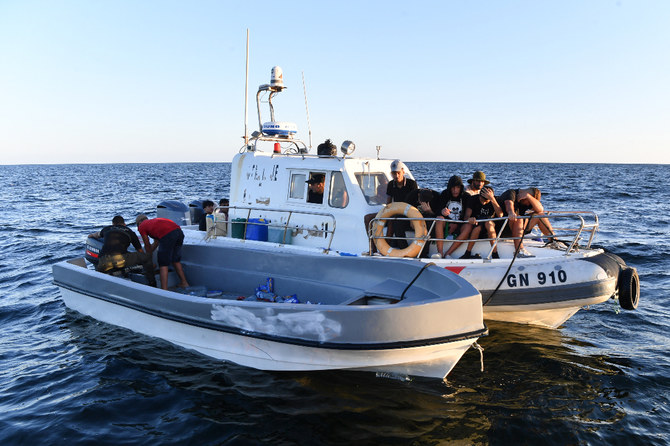
TUNIS, April 23 : The Tunisian coast guard has retrieved the bodies of 19 migrants who were trying to reach the Italian island of Lampedusa, the national guard said on Tuesday.
The latest incident took the number of migrant deaths off the Tunisian coast to nearly 200 in first four months of this year.
Israeli military rejects allegations of burying Palestinians in mass graves at Gaza hospital
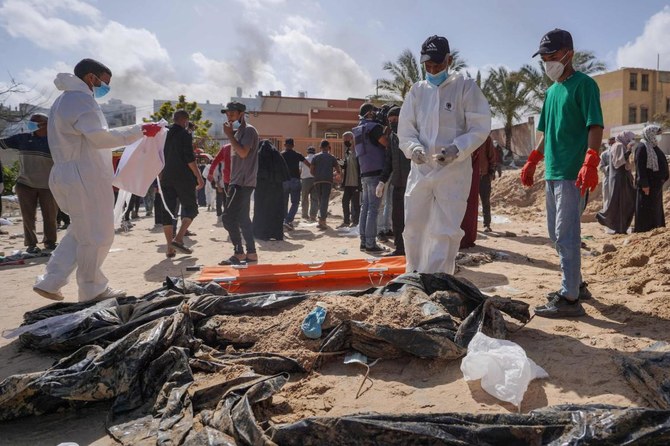
- The military said corpses already buried at Nasser hospital were examined as part of search for hostages
- UN calls for international probe into deaths at Gaza hospitals
GENEVA: Israeli military on Tuesday rejected allegations that its forces buried Palestinians in mass graves at a Gaza hospital, after the United Nations called for international investigation into the deaths during Israeli sieges, saying war crimes may have been committed.
In a statement, the military said corpses already buried at Nasser hospital were examined as part of search for hostages.
The UN rights office said it was “horrified” by the destruction of Gaza’s biggest hospital, Al-Shifa in Gaza City, and its second largest, the Nasser Medical Complex in Khan Yunis.
It called for an international investigation into reports of mass graves at the two Gaza hospitals destroyed in Israeli sieges.
On Monday, the Palestinian territory’s Civil Defense agency said health workers had uncovered more than 200 bodies of people killed and buried at Nasser hospital, which was besieged by Israeli troops last month.
In early April the World Health Organization said Al-Shifa had been destroyed by an Israeli siege, leaving an “empty shell” containing many bodies.
The UN rights office on Tuesday demanded “independent, effective and transparent investigations into the deaths.”
“Given the prevailing climate of impunity, this should include international investigators,” UN rights chief Volker Turk said in a statement.
Hospitals, which are protected under international law, have repeatedly come under Israeli bombardment over more than six months of war in Gaza.
Israel has accused Palestinian militant group Hamas of using Gazan medical facilities as command centers and to hold hostages abducted during its attack inside Israel on October 7.
Hamas has denied those claims.
International law violations
“Hospitals are entitled to very special protection under international humanitarian law,” Turk pointed out.
“And the intentional killing of civilians, detainees and others who are hors de combat is a war crime.”
The UN rights office said it did not have access to independent information as to what had transpired at the two hospitals.
But spokeswoman Ravina Shamdasani said efforts were under way to corroborate reports and details given by Gaza authorities.
The latter say 283 bodies were recovered from Nasser hospital, including 42 that had been identified.
“Victims had reportedly been buried deep in the ground and covered with waste,” she told reporters in Geneva.
Older people, women and wounded were reportedly among the dead, she said.
Others were allegedly “found with their hands tied and stripped of their clothes.”
As for Al-Shifa, the Israeli army has said around 200 Palestinians were killed during its military operation at the hospital
Shamdasani pointed to reports indicating that this toll “may be an underestimate.”
Around 30 bodies were reported found buried in two graves in the courtyard of Al-Shifa hospital.
“And there are reports that the hands of some of these bodies were also tied,” Shamdasani said.
So far, she said, the UN “can’t corroborate the exact figures” of people killed at the two hospitals, underlining: “This is why we are stressing the need for international investigations.”
“Clearly there have been multiple bodies discovered,” she said.
The reports that some had their hands tied indicated “serious violations” of international law, she added.
“These need to be subjected to further investigation... They can’t just be more reports in this horrific war that just pass under the radar.”
Qatar Foreign Ministry: No justification to end Hamas’ presence in Doha
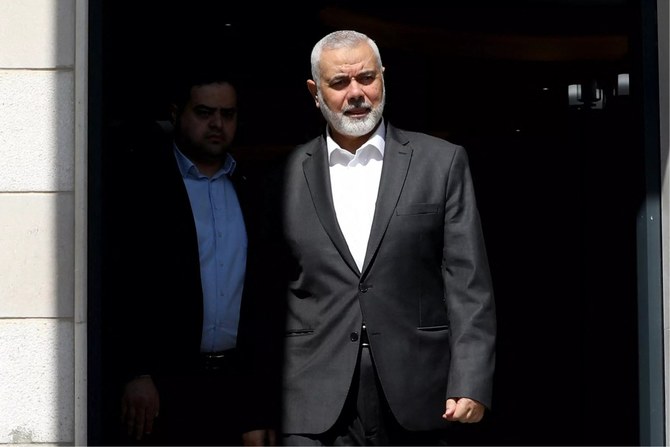
- Qatar said it was re-evaluating its role as mediator in ceasefire talks between Israel and the Palestinian group Hamas
DUBAI: Qatar said on Tuesday there was no justification to end the presence of an office for Palestinian militant group Hamas in Doha while its mediation efforts continued in the Gaza war.
Foreign Ministry spokesperson Majed Al-Ansari added in a press conference that Qatar remained committed to mediation but was reassessing its role in "frustration with attacks" on its efforts.
Last week, Qatar said it was re-evaluating its role as mediator in ceasefire talks between Israel and the Palestinian group Hamas, citing concerns that its efforts are being undermined by politicians seeking to score points.
Qatari Prime Minister Sheikh Mohammed bin Abdulrahman Al-Thani, who is also foreign minister, said there was a "misuse of this mediation for narrow political interests, and this necessitated Qatar to undertake a full evaluation of this role".




